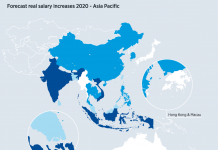Case studies from Costa Rica, El Salvador, Mexico and Panama show that women’s success as business owners and employers can be influenced by the size of their enterprise, the economic sectors in which they operate, their education and professional experience.
The share of women-owned businesses in Central America rose by almost 60 per cent (from 13.9 to 24.5 per cent) between 1991 and 2018, according to a new ILO publication. Case studies from Costa Rica, El Salvador, Mexico (Chihuahua) and Panama show that, on average, 22.3 per cent of business owners in Costa Rica are women, 29 per cent in El Salvador, 15.3 per cent in Chihuahua, Mexico, and 22.4 per cent in Panama. The factors driving many women to start their own businesses are precarious economic conditions, lack of career prospects in companies and the absence of well-paid job opportunities.
The publication, Women in business in Central America , issued by the ILO’s Bureau for Employers’ Activities (ACT/EMP), says that women’s success as business owners and employers can be influenced by the size of their enterprise, the economic sectors in which they operate, education and professional experience. The case studies also showed that women entrepreneurs were better educated than men in Costa Rica, Mexico (Chihuahua) and Panama, and had similar education levels in El Salvador.
Nevertheless, in all four areas, the average levels of profit from businesses run by women was lower than those run by men. For example, in Panama the average monthly profits for male own-account workers and employers* were higher than for women, by more than 78 and 40 per cent, respectively. The difference in profits between men and women entrepreneurs becomes more acute when moving up the earnings distribution. Among those in the top 10 per cent earnings level (90–100 percentile), women make on average US$663 less than men.
The Costa Rica case study found that the more experience women have in running a business, the more successful they become. It showed that while relatively young enterprises (up to nine years of operation) are more profitable when they are run by men, this is not the case with mature enterprises managed by better-educated women. These enterprises can be as profitable or even significantly more profitable than those managed by men. “Improving access to finance or an affordable cost of capital through development banking for women is a critical step to supporting their endeavours and enabling them to become more successful when their businesses are growing, said Deborah France-Massin, Director of the ILO Bureau for Employers’ Activities.
The report highlights the need for comprehensive policies to spur women’s entrepreneurship, based on opportunities for business success rather than as a basic survival strategy. Improved quality, coverage and access to education as well as skills enhancement could significantly boost the likelihood for women to be successful employers, it says.
ILO






















